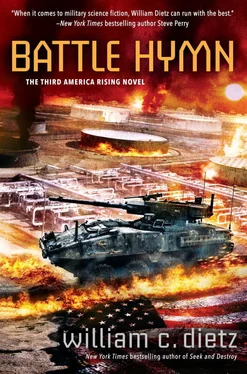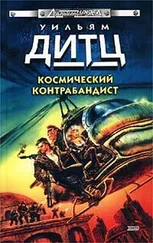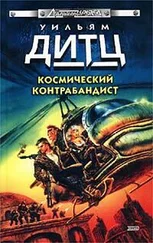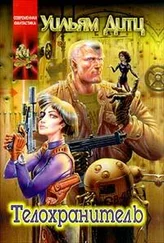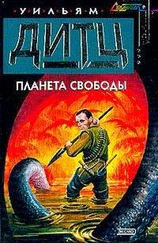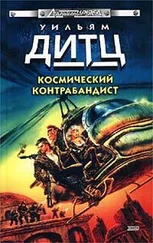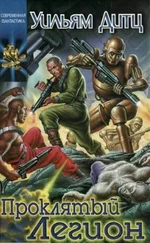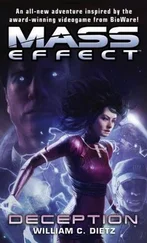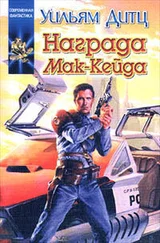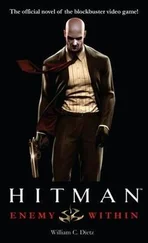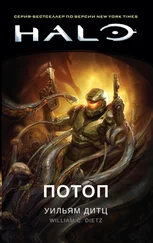Selock drained his glass. “Yes. Sloan made a serious mistake.”
“Perhaps,” Bo agreed. “Tell me something, Orson… Did you lose some money?”
Selock looked away, waved to a waiter, and held his empty glass up for the man to see. Then he turned back. “Enough shop talk, Bo… How ’bout those Astros? They won’t have to play the Yankees, thank God.”
Bo had his answers. Lemaire and his cronies had been preparing to run, and that included Selock, a man who’d been a warrior once. There was some news to savor, however. The rats were trapped on the sinking ship, and they’d be forced to fight if they wanted to survive. He raised his wineglass. “To the Astros… Long may they prosper.”
There are known knowns. These are things we know that we know. There are known unknowns. That is to say, there are things that we know we don’t know. But there are also unknown unknowns. There are things we don’t know we don’t know.
—DONALD RUMSFELD
FORT KNOX, KENTUCKY
Sloan entered the executive conference room to discover that a large number of his closest associates were already present. The group included his military attaché, Major Sam McKinney; Secretary of State George Henderson; Secretary of Defense Frank Garrison; and Chairman of the Joint Chiefs Four-Star General Herman Jones. They were seated at a circular table and stood as he entered.
Sloan paused, looked down at the sheet of paper with his schedule on it, and back up again. “Wow, there’s a lot of brainpower in this room… And I see a lot of serious-looking faces. Please take your seats. Now, what is Operation Exodus?”
There was a scraping of chairs as everyone except McKinney obeyed. He positioned himself next to a screen. Sloan found himself looking at an aerial photo of what ? A fort? A ghetto? It was impossible to tell. “Operation Exodus concerns 296 Union POWs,” McKinney said. “All of whom are being held in Detention Center One, near the town of Ascensión, Mexico.”
“Mexico?” Sloan demanded as he sat down. “What the hell are they doing there?”
“That’s a good question,” McKinney said. “And the answer begins with this man.”
Sloan saw the visage of a grim-faced man appear on the screen. “As you know,” McKinney continued, “General Bo Macintyre is General Jones’s peer within the Confederacy’s military structure.”
Sloan knew him all right… Or knew of him. Bo Macintyre was Robin Macintyre’s father. How could such a wonderful woman be related to such an asshole? Sloan forced himself to concentrate. “Okay, keep going.”
The photo of Macintyre was replaced by the likeness of a gaunt brigadier general. “This is General Marcus Lorenzo,” McKinney explained. “He reports to General Macintyre—and has responsibility for feeding, housing, and looking after our POWs. And, in keeping with the Libertarian principles that guide the Confederacy, Lorenzo chose to privatize his area of responsibility. And like any good conservative, he took the work to the lowest bidder who, in this case, was located in Mexico. The same country that is currently sending mercenaries to fight for the Confederacy.”
Secretary of State Henderson had a jowly face and a compact body. “We submitted numerous protests to the Mexican government,” he said. “But they were ignored.”
“So the POWs are being held in Ascensión, Mexico,” Sloan said slowly. “Where, exactly, is that ?”
Secretary of Defense Garrison had wispy hair and wore wire-rimmed glasses. He was cleaning them with a handkerchief. “It’s about 120 miles southwest of El Paso,” he answered. “In an area known for its lawlessness.”
“Exactly,” McKinney agreed. “In fact, the woman who runs the detention center is a well-known drug smuggler. Her name is Rosa Alvarez Carbone. But she’s better known as ‘ La ángel de la muerte ,’ or the Angel of Death. The name stems from both her angelic appearance and the fact that she is responsible for killing at least 182 people, thirty-seven by her own hand.
“So, as you might expect, our POWs have been subjected to all sorts of abuse. Some were killed during a mass-escape attempt, there’s no medical care to speak of, and they’re starving.”
Sloan looked from face to face. “I assume you have a plan.”
General Jones had a buzz cut, brown skin, and a chestful of ribbons. “We do,” he said gravely.
“I’m all ears,” Sloan replied. “Lay it on me.”
They did. And Sloan smiled when the presentation was over. “It won’t be easy… But you’re well aware of that. I want our people back.”
BAYOU CHOCTAW STRATEGIC PETROLEUM RESERVE
Mac knew she wasn’t going to die—and felt a mix of emotions. Happiness, guilt, and relief all battled each other for dominance. After surrounding the Bayou Choctaw Petroleum Reserve, the brigade settled in for a night of psychological warfare. Flares went off at random intervals. Mortar shells fell occasionally. And a cheesy recording of “Yankee Doodle Dandy” blared through portable speakers. Anything to keep the Confederates on edge. Unfortunately, that cut two ways and, after spending the night in a Stryker, Mac was exhausted.
An MRE was followed by a predawn staff meeting with Colonel Walters. And that was when Mac learned that Major Corvo was going to lead all of the troops, hers included, up and over the defensive berm. Or try to anyway… Because the outcome was anything but certain.
And that’s why Mac wasn’t going to die, and why she felt guilty about it. Her job was to lead Mac’s Marauders, not stand on top of a Stryker and watch the battle like a spectator at a football game.
But Walters was not only insistent but fundamentally correct. Corvo didn’t need a spare major looking over his shoulder. So Mac was left to peer through a pair of binoculars as the sun rose behind her, and the infantry advanced. The brigade’s redlegs fired the first shots. Their 155mm howitzers were stationed five miles back from the Confederate base, and the first shell produced a rumbling sound as it passed overhead. That was followed by a dull thump, and a column of smoke, as the round exploded somewhere within the enemy compound. More shells followed.
Would the artillery fire destroy the facilities the brigade was supposed to preserve? Maybe. But Walters didn’t care if the brass slapped her wrist. Not if the strategy worked. Mac admired the Marine’s style. Walters was an asskicker… No doubt about that.
The artillery barrage ended as suddenly as it had begun. And, like attacks launched on behalf of countless causes over the last three thousand years, soldiers charged forward. Never mind what kind of weapons they carried. The essence of the assault was no different than Wellington’s attack on the city of Badajoz. There had been artillery, a wall, and a storm. Just the thought of it seemed to summon the rain.
Like the French, the Confederates were standing on top of the wall, firing down. Automatic weapons rattled, and grenades exploded, as the Union soldiers surged forward. They were able to take cover behind the concrete traffic barriers, which, ironically enough, had been put in place by the rebs. I’ll bet someone feels stupid now, Mac thought, as her Strykers and LAVs opened fire on the defenders.
Grenade launchers weren’t appropriate for the situation, but the big fifties had a lot of reach, and so did the Marine Corps’ chain guns. Keep their heads down, Mac thought, as the vic’s fifty began to chug. Red tracers drew a line between the STEEL BITCHand the top of the wall. And that was important because the Union troops were going to be extremely vulnerable as they made their way up the rain-slicked slope.
Читать дальше
